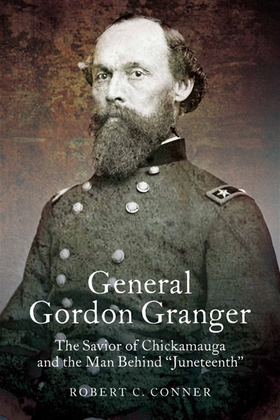
Lägg till önskelistan
General Gordon Granger e-bok
Pris
75 kr
This is the first full-length biography of the Civil War general who saved the Union army from catastrophic defeat at the Battle of Chickamauga, and went on to play major roles in the Chattanooga and Mobile campaigns. Immediately after the war, as commander of U.S. troops in Texas, his actions sparked the “Juneteenth” celebrations of slavery’s end, which continue to this day.
Granger’s first battle was at Wilson’s Creek, Missouri, and he soon thereafter rose thr...
E-Bok
75 kr
Pris
Förlag
Casemate
Utgiven
15 Februari 2021
Längd
264 sidor
Genrer
Historia & Arkeologi, Biografier & Memoarer, Fackböcker
Språk
English
Format
epub
Kopieringsskydd
Vattenmärkt
ISBN
9781612001869
This is the first full-length biography of the Civil War general who saved the Union army from catastrophic defeat at the Battle of Chickamauga, and went on to play major roles in the Chattanooga and Mobile campaigns. Immediately after the war, as commander of U.S. troops in Texas, his actions sparked the “Juneteenth” celebrations of slavery’s end, which continue to this day.
Granger’s first battle was at Wilson’s Creek, Missouri, and he soon thereafter rose through the ranks—cavalry, then infantry—in early 1863 vying with Forrest and Van Dorn for control of central Tennessee. The artillery platform he erected at Franklin, dubbed Fort Granger, would soon overlook the death knell of the main Confederate army in the west.
Granger’s first fame, however, came at Chickamauga, when the Rebel Army of Tennessee came within a hair’s-breadth of destroying the Union Army of the Cumberland. Without orders—even defying them—Granger marched his Reserve Corps to the scene of the hottest action, where Thomas was just barely holding on with the rump of Rosecrans’ army. Bringing fresh ammunition and hurling his men against Longstreet’s oncoming legions, Granger provided just enough breathing space to prevent that Union defeat from becoming the worst open-field battle disgrace of the war.
Granger was then given command of a full infantry corps, but just proved too odd of a fellow to promote further. At Chattanooga he got on the nerves of U.S. Grant for going off to shoot cannons instead of commanding his troops (he’d actually indulged this impulse also at Chickamauga) and Sherman had no use for him either. So he went down to join Farragut in the conquest of Mobile, Alabama, leading land operations against the Confederate forts.
This long-overdue biography sheds fascinating new light on a colorful commander who fought through the war in the West from its first major battles to its last, and even left his impact on the Reconstruction beyond.




